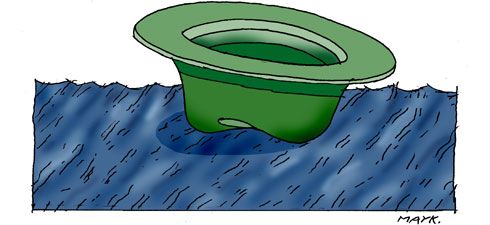Ireland is facing economic ruin.
While most people would trace our ruin to to the bank guarantee of September 2008, the real error was in sticking with the guarantee long after it had become clear that the bank losses were insupportable. Brian Lenihan’s original decision to guarantee most of the bonds of Irish banks was a mistake, but a mistake so obvious and so ridiculous that it could easily have been reversed. The ideal time to have reversed the bank guarantee was a few months later when Patrick Honohan was appointed governor of the Central Bank and assumed de facto control of Irish economic policy.
As a respected academic expert on banking crises, Honohan commanded the international authority to have announced that the guarantee had been made in haste and with poor information, and would be replaced by a restructuring where bonds in the banks would be swapped for shares.
Instead, Honohan seemed unperturbed by the possible scale of bank losses, repeatedly insisting that they were “manageable”. Like most Irish economists of his generation, he appeared to believe that Ireland was still the export-driven powerhouse of the 1990s, rather than the credit-fuelled Ponzi scheme it had become since 2000; and the banking crisis no worse than the, largely manufactured, government budget crisis of the late 1980s.
Rising dismay at Honohan’s judgment crystallised into outright scepticism after an extraordinary interview with Bloomberg business news on May 28th last year. Having overseen the Central Bank’s “quite aggressive” stress tests of the Irish banks, he assured them that he would have “the two big banks, fixed by the end of the year. I think it’s quite good news. The banks are floating away from dependence on the state and will be free standing”.
Honohan’s miscalculation of the bank losses has turned out to be the costliest mistake ever made by an Irish person. Armed with Honohan’s assurances that the bank losses were manageable, the Irish government confidently rode into the Little Bighorn and repaid the bank bondholders, even those who had not been guaranteed under the original scheme. This suicidal policy culminated in the repayment of most of the outstanding bonds last September.
Disaster followed within weeks. Nobody would lend to Irish banks, so that the maturing bonds were repaid largely by emergency borrowing from the European Central Bank: by November the Irish banks already owed more than €60 billion. Despite aggressive cuts in government spending, the certainty that bank losses would far exceed Honohan’s estimates led financial markets to stop lending to Ireland.
On November 16th, European finance ministers urged Lenihan to accept a bailout to stop the panic spreading to Spain and Portugal, but he refused, arguing that the Irish government was funded until the following summer. Although attacked by the Irish media for this seemingly delusional behaviour, Lenihan, for once, was doing precisely the right thing. Behind Lenihan’s refusal lay the thinly veiled threat that, unless given suitably generous terms, Ireland could hold happily its breath for long enough that Spain and Portugal, who needed to borrow every month, would drown.
At this stage, with Lenihan looking set to exploit his strong negotiating position to seek a bailout of the banks only, Honohan intervened. As well as being Ireland’s chief economic adviser, he also plays for the opposing team as a member of the council of the European Central Bank, whose decisions he is bound to carry out. In Frankfurt for the monthly meeting of the ECB on November 18th, Honohan announced on RTÉ Radio 1’s Morning Ireland that Ireland would need a bailout of “tens of billions”. Read full article in the Irish Times...
Was this article useful? If so we are delighted!
It is freely available because we believe that the right to free and independent information is essential for democracy. But this right is not guaranteed forever, and independence comes at a cost. We need your support in order to continue publishing independent, multilingual news for all Europeans.
Discover our subscription offers and their exclusive benefits and become a member of our community now!












